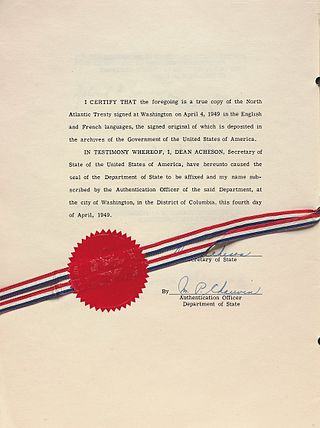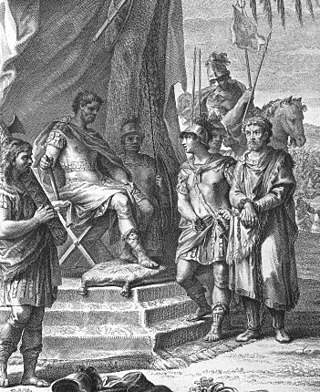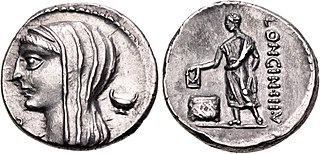
Marcus Tullius Cicero was a Roman statesman, lawyer, scholar, philosopher, writer and Academic skeptic, who tried to uphold optimate principles during the political crises that led to the establishment of the Roman Empire. His extensive writings include treatises on rhetoric, philosophy and politics. He is considered one of Rome's greatest orators and prose stylists and the innovator of what became known as "Ciceronian rhetoric". Cicero was educated in Rome and in Greece. He came from a wealthy municipal family of the Roman equestrian order, and served as consul in 63 BC.

The North Atlantic Treaty Organization, also called the North Atlantic Alliance, is an intergovernmental military alliance of 32 member states – 30 European and two North American. Established in the aftermath of World War II, the organization implements the North Atlantic Treaty, signed in Washington, D.C., on 4 April 1949. NATO is a collective security system: its independent member states agree to defend each other against attacks by third parties. During the Cold War, NATO operated as a check on the threat posed by the Soviet Union. The alliance remained in place after the dissolution of the Soviet Union and the Warsaw Pact and has been involved in military operations in the Balkans, the Middle East, South Asia, and Africa. The organization's motto is animus in consulendo liber. The organization's strategic concepts include deterrence.

The North Atlantic Treaty is the treaty that forms the legal basis of, and is implemented by, the North Atlantic Treaty Organization (NATO). The treaty was signed in Washington, D.C., on 4 April 1949.

Lucius Sergius Catilina, known in English as Catiline, was a Roman politician and soldier, best known for instigating the Catilinarian conspiracy, a failed attempt to violently seize control of the Roman state in 63 BC.

The Catilinarian orations are four speeches given in 63 BC by Marcus Tullius Cicero, one of the year's consuls. The speeches all related to the discovery, investigation, and suppression of the Catilinarian conspiracy, a plot that year to overthrow the republic. All of the speeches in the form available today were published, probably around 60, as part of Cicero's attempt to justify his actions during the consulship; whether they are accurate reflections of the original speeches in 63 is debated.

Jugurtha or Jugurthen was a king of Numidia. When the Numidian king Micipsa, who had adopted Jugurtha, died in 118 BC, Jugurtha and his two adoptive brothers, Hiempsal and Adherbal, succeeded him. Jugurtha arranged to have Hiempsal killed and, after a civil war, defeated and killed Adherbal in 112 BC.

Gaius Sallustius Crispus, usually anglicised as Sallust, was a Roman historian and politician from a plebeian family. Probably born at Amiternum in the country of the Sabines, Sallust became a partisan of Julius Caesar, circa 50s BC. He is the earliest known Latin-language Roman historian with surviving works to his name, of which Conspiracy of Catiline, The Jugurthine War, and the Histories remain extant. As a writer, Sallust was primarily influenced by the works of the 5th-century BC Greek historian Thucydides. During his political career he amassed great and ill-gotten wealth from his governorship of Africa.

The gens Furia, originally written Fusia, and sometimes found as Fouria on coins, was one of the most ancient and noble patrician houses at Rome. Its members held the highest offices of the state throughout the period of the Roman Republic. The first of the Furii to attain the consulship was Sextus Furius in 488 BC.

The gens Cassia was a Roman family of great antiquity. The earliest members of this gens appearing in history may have been patrician, but all those appearing in later times were plebeians. The first of the Cassii to obtain the consulship was Spurius Cassius Vecellinus, in 502 BC. He proposed the first agrarian law, for which he was charged with aspiring to make himself king, and put to death by the patrician nobility. The Cassii were amongst the most prominent families of the later Republic, and they frequently held high office, lasting well into imperial times. Among their namesakes are the Via Cassia, the road to Arretium, and the village of Cassianum Hirpinum, originally an estate belonging to one of this family in the country of the Hirpini.
Sapere aude is the Latin phrase meaning "Dare to know"; and also is loosely translated as "Have courage to use your own reason", "Dare to know things through reason". Originally used in the First Book of Letters, by the Roman poet Horace, the phrase Sapere aude became associated with the Age of Enlightenment, during the 17th and 18th centuries, after Immanuel Kant used it in the essay "Answering the Question: What Is Enlightenment?" (1784). As a philosopher, Kant claimed the phrase Sapere aude as the motto for the entire period of the Enlightenment, and used it to develop his theories of the application of reason in the public sphere of human affairs.

Charles Anthon was an American classical scholar. Anthon was a professor at Columbia College and became headmaster of its grammar and preparatory school. He produced classical works for schools, which contained assistance and translations in the notes. He had a disagreement with Martin Harris over an account where they discussed the authenticity of the Anthon Transcript of the Book of Mormon. Anthon was also an acquaintance of writer Edgar Allan Poe. He died in New York City at the age of 69.

The Temple of Concord in the ancient city of Rome refers to a series of shrines or temples dedicated to the Roman goddess Concordia, and erected at the western end of the Roman Forum. The earliest temple is believed to have been vowed by Marcus Furius Camillus in 367 BC, but it may not have been built until 218 BC by L. Manlius. The temple was rebuilt in 121 BC, and again by the future emperor Tiberius between 7 BC and AD 10.
Quintus Caecilius Metellus Celer was a Roman politician who was consul in 60 BC and in the next year opposed Pompey, Caesar, and the so-called First Triumvirate's political programme. He was a member of the powerful and influential plebeian noble family, the Caecilii Metelli. Prior to 62 BC, he was an ally of Pompey and had served as urban praetor in 63, augur by 63 BC, possibly aedile in 67 BC, and plebeian tribune in either 72 or 68 BC.
Roman historiography stretches back to at least the 3rd century BC and was indebted to earlier Greek historiography. The Romans relied on previous models in the Greek tradition such as the works of Herodotus and Thucydides. Roman historiographical forms are usually different from their Greek counterparts, however, and often emphasize Roman concerns. The Roman style of history was based on the way that the Annals of the Pontifex Maximus, or the Annales Maximi, were recorded. The Annales Maximi include a wide array of information, including religious documents, names of consuls, deaths of priests, and various disasters throughout history. Also part of the Annales Maximi are the White Tablets, or the "Tabulae Albatae", which consist of information on the origin of the Roman Republic.
Marcus Marius Gratidianus was a Roman praetor and supporter of Gaius Marius during the civil war between the followers of Marius and Lucius Cornelius Sulla. As praetor, Gratidianus is known for his policy of currency reform during the economic crisis of the 80s BC.

The gens Annia was a plebeian family at ancient Rome. Livy mentions a Lucius Annius, praetor of the Roman colony of Setia, in 340 BC, and other Annii are mentioned at Rome during this period. Members of this gens held various positions of authority from the time of the Second Punic War, and Titus Annius Luscus attained the consulship in 153 BC. In the second century AD, the Annii gained the Empire itself; Marcus Aurelius was descended from this family.
The career of Julius Caesar before his consulship in 59 BC was characterized by military adventurism and political persecution. Julius Caesar was born on 12 July 100 BC into a patrician family, the gens Julia, which claimed descent from Iulus, son of the legendary Trojan prince Aeneas, supposedly the son of the goddess Venus. His father died when he was just 16, leaving Caesar as the head of the household. His family status put him at odds with the Dictator Lucius Cornelius Sulla, who almost had him executed.

The Catilinarian conspiracy was an attempted coup d'état by Lucius Sergius Catilina (Catiline) to overthrow the Roman consuls of 63 BC – Marcus Tullius Cicero and Gaius Antonius Hybrida – and forcibly assume control of the state in their stead.

The Bellum Jugurthinum is an historical monograph by the Roman historian Sallust, published in or around 41 BC. It describes the events of the Jugurthine War between the Roman Republic and King Jugurtha of Numidia. Sallust alleges that Jugurtha was able to repeatedly bribe corrupted Roman officials during the war, which Sallust took as indicative of a broader moral decline in the late Republic. In this way, the Bellum Jugurthinum is thematically similar to Sallust's first monograph, the Bellum Catilinae. The Bellum Jugurthinum is the main historical source for the Jugurthine War.












